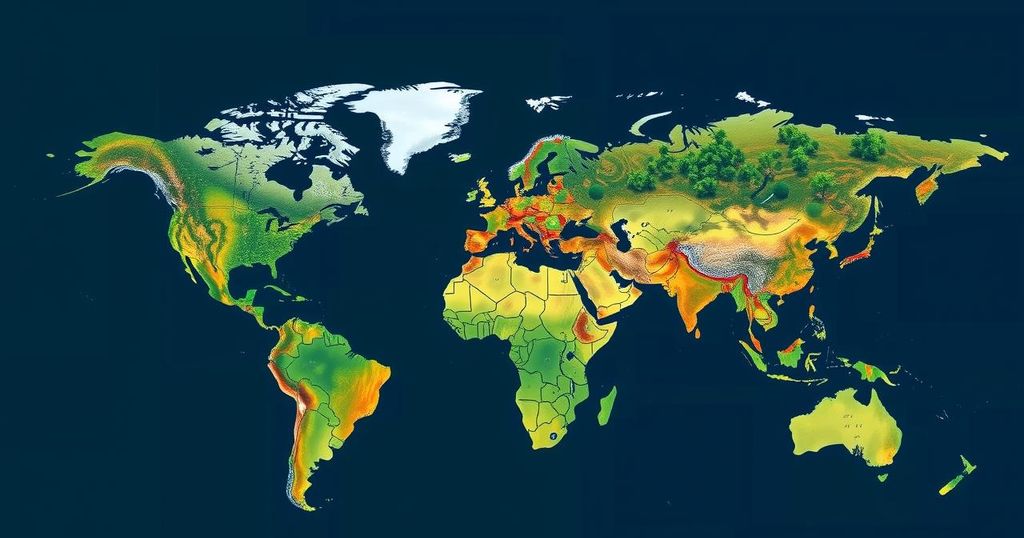Wealthier Nations Compensate Poorer Countries for Climate Change Damages
Wealthy nations are beginning to compensate poorer countries for damages caused by climate change-induced disasters, with significant attention on initiatives like the loss and damage fund. Following Cyclone Freddy in Malawi, families received cash payments to aid their recovery. However, experts warn that current pledges may not suffice as climate-related catastrophes increase in frequency and severity.
The devastating impact of climate change has led to significant financial assistance being provided from wealthier nations to poorer ones facing climate-related disasters. This initiative, known as “loss and damage” compensation, is particularly evident in southern Malawi, where victims of Cyclone Freddy received funding to aid in their recovery. Christopher Bingala, a subsistence farmer who lost his home and livestock to flooding, used a cash payment of $750 to help rebuild his life. This form of compensation is part of a broader movement initiated during climate negotiations, aimed at addressing the inequities faced by low-income countries that contribute minimally to global pollution but suffer greatly from its consequences. So far, approximately $720 million has been pledged by richer nations; however, experts caution that this amount is insufficient in the face of escalating climate disasters.
Amid negotiations taking place at COP29 in Baku, Azerbaijan, countries are deliberating on the amount owed to developing nations as part of a larger climate finance package. Prime Minister Philip Davis of the Commonwealth of the Bahamas emphasized the urgent need for accountability, urging wealthier nations to acknowledge their role in the climate crisis.
Cyclone Freddy not only affected Malawi but displaced around 650,000 individuals across several nations, followed by an acute food shortage. Families like Bingala’s were forced to sustain themselves with what little food they could find, highlighting the desperation faced by many in the aftermath of such disasters. The funding received by Bingala from the Scottish government represents a pioneering effort to prioritize loss and damage, enabling families to rebuild. This pilot program is managed by GiveDirectly, a non-profit that provides direct cash assistance without conditions, allowing recipients the freedom to use funds as they see fit.
Despite the progress made, the need for loss and damage financing is only expected to increase as weather-related catastrophes become more frequent and severe. In fact, estimates predict that by 2030, the demand for such funding could escalate to $250 billion annually. Davis voiced concerns over national debts exacerbated by climate events, reflecting a broader reality for many nations confronting environmental challenges. He urged collective action from richer countries, underscoring that the repercussions of inaction would not remain confined within individual nations. Loss and damage funding not only serves as a financial lifeline for recovery but also highlights the need for a more comprehensive approach to address the broader consequences of climate change-induced disasters.
The rising costs associated with climate change disasters disproportionately affect low-income countries, which contribute minimally to global greenhouse gas emissions. Recent funding efforts aim to support these nations in recovery and adaptation, showcasing a shift towards accountability among wealthier countries. The creation of a loss and damage compensation fund stems from international climate negotiations, reaffirming commitments to aid vulnerable populations. As extreme weather events become more prevalent, the urgent need for effective financial mechanisms to address recovery efforts is increasingly recognized in global discussions.
In summary, the loss and damage compensation initiative represents a critical acknowledgment of the disparities faced by poorer nations in dealing with climate change. The financial assistance provided is a life-saving measure for many, underscoring the responsibility of richer countries to address their historical contributions to pollution. As climate disasters become more common, the commitment to adequate funding and support will need to grow to prevent further crises and ensure that vulnerable populations can rebuild and adapt to changing environments.
Original Source: www.wypr.org




Post Comment